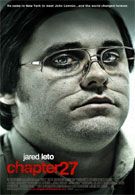As a general rule, when an actor gains a lot of weight for a film the movie is generally worth watching (e.g. Syriana, Monster, Bridget Jones’ Diary) - incidentally the opposite can be said of donning a fat suit (e.g. Big Momma’s House , Norbit, Shallow Hal) - so I was surprised that even Jared Leto’s extra 67 pounds of paunch couldn’t save me from wanting to turn the page on the incredibly boring Chapter 27.
Leto force fed himself to play Mark David Chapman, John Lennon’s infamous assassin, is currently serving time in Attica prison. Rather than give the audience any character background whatsoever, the film begins with Chapman returning to New York City armed with a handgun, intending to kill either himself or some unknown foe. We then follow Chapman for three days as he stakes out John Lennon’s apartment building and subsequently befriends, then alienates fellow Beatles fan Jude (Lindsay Lohan in her least offensive role to date) and paparazzo Paul (Judah Friedlander). Meanwhile, Chapman begins to reenact sequences from The Catcher in the Rye, slowly convincing himself that he is Holden Caulfield and must murder John Lennon for turning his back on the fans who adored him.
You have to give Leto credit for committing to the role. Not only did he torture his body to mirror Chapman’s portly frame, but he also adopted the killer’s high-pitched southern drawl and quirky mannerisms. Unfortunately, while Jared’s transformation is compelling, Chapman’s is not. With such a narrow focus on Chapman’s final days, the audience has no opportunity to see him as anything other than a crazy weirdo, which is less appealing that it sounds. In fact, Chapman was supposedly very charismatic in person, but Leto plays him so creepy that it’s completely implausible Jude, or any of Lennon’s doormen would have ever open up to him. Of course, the filmmakers were tiptoeing around making such a notorious killer seem mildly sympathetic, but it wouldn’t have hurt anyone’s memory to give us a little character development.
They do give us one courtesy phone call revealing that he’s married (baffling the viewer considering the previous scene is an extremely awkward interlude with a prostitute) and a quick scene where he lays out his prized possessions, but those are the only hints that Chapman ever led what could be considered a normal life. We are subsequently left to ascertain Chapman’s character through painful and unnecessary voiceover (haven’t they heard of “show don’t tell”) and extreme close-ups of Leto’s blacked out eyes and tubby frame (looks like they were relying a little too heavily on the weight gain = box office smash phenomenon).
Meanwhile the film depends on cheesy jump cuts and melodramatic music to instill a sense of tension, which is sort of like trying to spruce up a game of golf with a heavy metal soundtrack – it just doesn’t work. In the end, the 84 minutes painfully drag on so that even the most devout of Lennon fans will be surprised by how much they want to fast forward to the climactic killing scene.
Those who were concerned that this film might dishonor Lennon’s memory by glorifying his killer have nothing to worry about – the only reputations at stake after Chapter 27 are those of its writers and producers. Even Leto, who saves the film from Chapter 11 with his notable performance, is likely to walk away with nothing more than a bad case of the gout.
Most Popular




